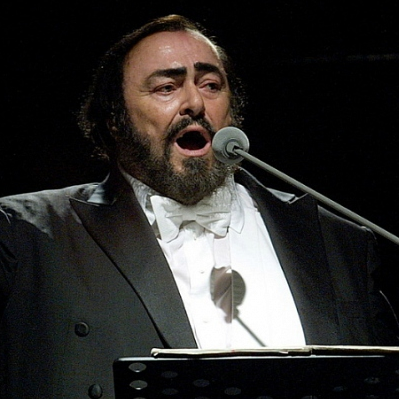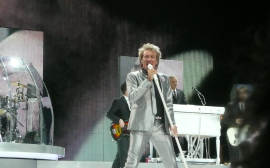
PAVAROTTI
Luciano
Italian operatic tenor
Date of Birth: 12 October 1935
Date death: 6 September 2007
Age at the time of death: 71 years old
Zodiac sign: Libra
Profession: Operatic tenor
Biography
Luciano Pavarotti was an Italian operatic tenor who during the late part of his career crossed over into popular music, eventually becoming one of the most acclaimed and loved tenors of all time. He made numerous recordings of complete operas and individual arias, gaining worldwide fame for his tone, and achieving the honorific title "King of the High Cs".
As one of the Three Tenors, who performed their first concert during the 1990 FIFA World Cup before a global audience, Pavarotti became well known for his televised concerts and media appearances. From the beginning of his professional career as a tenor in 1961 in Italy to his final performance of "Nessun dorma" at the 2006 Winter Olympics in Turin, Pavarotti was at his best in bel canto operas, pre-Aida Verdi roles, and Puccini works such as La bohème, Tosca, Turandot and Madama Butterfly. He sold over 100 million records, and the first Three Tenors recording became the best-selling classical album of all time. Pavarotti was also noted for his charity work on behalf of refugees and the Red Cross, amongst others. He died from pancreatic cancer on 6 September 2007.
Early life and musical training
Luciano Pavarotti was born in 1935 on the outskirts of Modena in Northern Italy, the son of Fernando Pavarotti, a baker and amateur tenor, and Adele Venturi, a cigar factory worker. Although he spoke fondly of his childhood, the family had little money; its four members were crowded into a two-room apartment. According to Pavarotti, his father had a fine tenor voice but rejected the possibility of a singing career because of nervousness. World War II forced the family out of the city in 1943. For the following year they rented a single room from a farmer in the neighbouring countryside, where the young Pavarotti developed an interest in farming.
After abandoning the dream of becoming a football goalkeeper, Pavarotti spent seven years in vocal training. Pavarotti's earliest musical influences were his father's records, most of them featuring the popular tenors of the day—Beniamino Gigli, Giovanni Martinelli, Tito Schipa, and Enrico Caruso. Pavarotti's favourite tenor and idol was Giuseppe Di Stefano and he was also deeply influenced by Mario Lanza, saying: "In my teens I used to go to Mario Lanza movies and then come home and imitate him in the mirror". At around the age of nine he began singing with his father in a small local church choir.
In addition to music, as a child Pavarotti enjoyed playing football. When he graduated from the Scuola Magistrale he was interested in pursuing a career as a professional football goalkeeper, but his mother convinced him to train as a teacher. He subsequently taught in an elementary school for two years but finally decided to pursue a music career. His father, recognising the risk involved, only reluctantly gave his consent. Pavarotti began the serious study of music in 1954 at the age of 19 with Arrigo Pola, a respected teacher and professional tenor in Modena who offered to teach him without remuneration. According to conductor Richard Bonynge, Pavarotti never learned to read music.
In 1955, he experienced his first singing success when he was a member of the Corale Rossini, a male voice choir from Modena that also included his father, which won first prize at the International Eisteddfod in Llangollen, Wales. He later said that this was the most important experience of his life, and that it inspired him to become a professional singer. At about this time Pavarotti first met Adua Veroni. They married in 1961. When his teacher Arrigo Pola moved to Japan, Pavarotti became a student of Ettore Campogalliani, who at that time was also teaching Pavarotti's childhood friend, Mirella Freni, whose mother worked with Luciano's mother in the cigar factory. Like Pavarotti, Freni went on to become a successful opera singer; they would go on to collaborate in various stage performances and recordings together.
During his years of musical study, Pavarotti held part-time jobs in order to sustain himself—first as an elementary school teacher and then as an insurance salesman. The first six years of study resulted in only a few recitals, all in small towns and without pay. When a nodule developed on his vocal cords, causing a "disastrous" concert in Ferrara, he decided to give up singing. Pavarotti attributed his immediate improvement to the psychological release connected with this decision. Whatever the reason, the nodule not only disappeared but, as he related in his autobiography: "Everything I had learned came together with my natural voice to make the sound I had been struggling so hard to achieve".
Film and television
Pavarotti's one venture into film was Yes, Giorgio (1982), a romantic comedy movie directed by Franklin J. Schaffner, in which he starred as the main character Giorgio Fini. The film was a critical and commercial failure, although it received an Academy Award nomination for Best Music, Original Song.
He can be seen to better advantage in Jean-Pierre Ponnelle's adaptation of Rigoletto for television, released that same year, or in his more than 20 live opera performances taped for television between 1978 and 1994, most of them with the Metropolitan Opera, and most available on DVD.
He received two Primetime Emmy Awards for his PBS variety specials Pavarotti in Philadelphia: La Boheme and Duke of Mantua, Rigoletto Great Performances.
Pavarotti, a 2019 documentary film about him, was directed by Ron Howard and produced with the cooperation of Pavarotti's estate using family archives, interviews and live music footage.
Born in one day
(Pig) .
Horoscope Libra: horoscope for today, horoscope for tomorrow, horoscope for week, horoscope for month, horoscope for year.

































